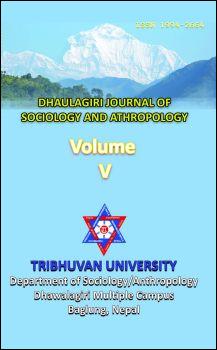Perceptions of Febrile Illness among Local People Living in Malaria Endemic villages in Central Hill Region of Nepal
DOI:
https://doi.org/10.3126/dsaj.v5i0.6359Keywords:
Perceptions, fever, malaria, typhoid, febrile illnessAbstract
Objective of this paper is to explore the perceptions of febrile illness among people living in malaria endemic areas of hill region. Qualitative data were collected from malaria endemic villages in Mahadevesthan VDC of Kavrepalanchok district through in-depth interviews and focus group discussions. Local people perceive febrile illnesses as common health problem. They classified febrile illnesses into sardi ko jwaro, dokh, lagu/laganiko jwaro and aulo jwaro. Fever occurring after engaging in heavy physical work is described as dagdi. Severe and complicated form of fever is interpreted as dokh in cultural meaning and typhoid as biomedical concept. Febrile illness which does not respond to biomedicine, but it is relieved by traditional ritual healing is labeled as lagani ko jwaro. Malaria fever is locally known as aul or aulo jwaro. People often avoid certain food such as sour curd, meat, egg, oily and spicy food during fever to prevent it from resulting in dokh (complicated fever). Herbal home remedy is rarely used in febrile illness. Now a day, local people interpret dokh as typhoid and aulo as malaria fever and seek medical treatment from local health institutions and private practitioners. Local perceptions of febrile illnesses such as dokh and aulo overlap with the biomedical concepts of typhoid and malaria fever due to interaction with both traditional healers and health care providers.
DOI: http://dx.doi.org/10.3126/dsaj.v5i0.6359
Dhaulagiri Journal of Sociology and Anthropology Vol. 5, 2011: 121-42




